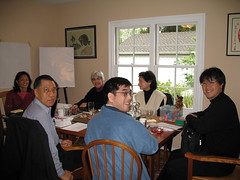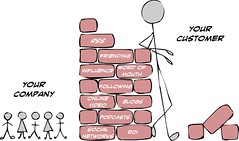People Follow You. The real secret to what matters most in leadership. Jeb Blount.
People Follow You. The real secret to what matters most in leadership. Jeb Blount. 2012. ISBN 9781118094013. I am a fan of Blount’s writing, always clear, concise and he gets right to it. His experience as a senior sales leader shows through. Since I maintain sales is a learned/experiential vs an academically taught skill, material like Blount’s is invaluable.
He starts out with principle one, ” You get paid for what your people do, not what you do. You need your people more than they need you.” This theme continues to be reinforced through the book in his other principles
- Follow the Golden Rule
- You are always on stage.
- People don’t do dumb things things on purpose
- People do things for their own reasons. not yours
- Change behaviors, not beliefs or styles
- You are not normal
A valuable read for every leader, especially sales.
Related articles
- Flexing Your Leadership Style – “People Follow You” by Jeb Blount (sellleadsucceed.com)
Category: Leadership, Management, Sales
Rocket Surgery Made Easy. The do-it-yourself guide to finding and fixing usability problems. Steve Krug.
Rocket Surgery Made Easy. The do-it-yourself guide to finding and fixing usability problems. Steve Krug. 2010. ISBN 97803216572999. Another Lean Management recommendation. Krug wrote Don’t make Me think – which I totally enjoyed and agree with. True to the author’s intent, this is a very usable book. He has six maxims (which you will find in the book). His writing style is delightful – tongue in cheek, self deprecating and above all clear and simple. Check out his sample usability test at www.rocketsurgerymadeeasy.com and watch the Demo Test file. It is very revealing as to why you will want to read this book. Is he onto something – well yes. In our practice we are daily being sent to complex, hard to understand what the company does, completely lacking on customer value company webpages. Most of the problems would be solve if they followed Krug’s easy to use suggestions. All I can think is usability is just not done. Everyone who has a webpage should read this book.
Related articles
- Rocket Surgery Made Easy: The Do-It-Yourself Guide to Finding and Fixing Usability Problems (bits.samiq.net)
- How Companies Are Using Design To Get Customers Or Get Acquired (grasshopper.com)
- How Personalized Search Changes SEO (and Doesn’t) (seomoz.org)

Social Media Metrics. How to measure and optimize your marketing investment. Jim Sterne.
Social Media Metrics. How to measure and optimize your marketing investment. Jim Sterne.2010. ISBN 9780470583784. An excellent resource referenced in Running Lean. Clearly written and not even close to being dated. I appreciated his comment near the end that the major shifts are happening on the buy side of the equation, while the sell side is falling behind the increasing sophistication and connectedness of the buyers. The warning I give to the “non Facebook” generation is that by not using these tools strategically now, you are completely ignorant of the sea shift of change going on. You are on a very gentle down-slope and do not know it Others who start the learning process, will slowly accelerate away as the environment shifts away from you. Very valuable resource and as he says this is some very heavy lifting (but not hard reading) . But it should scare the complacency out of senior management everywhere.

Category: Content Marketing, Marketing, Strategy
The End of Growth. But is that all bad? Jeff Rubin.
The End of Growth. But is that all bad? Jeff Rubin.2012. ISBN 9780307360892. Rubin writes very clear, well researched, easy to read and compelling books. (This one will take you two cross country flights to finish – but you will like it.) This is an update to his thesis ( Why Your World Is About to Get a Whole Lot Smaller) that energy prices will continue to rise taking the financial crisis, political stupidity, carbon offsets (likely will die), death of big Oil, big coal and European troubles into account . He holds that oil and food could be Zero sum games . If China/India increase their consumption, these is less for others and the prices will rise. Third world countries will not have the funds to afford the oil for growth nor for the food (Not a good looking future). (The Arab Spring was founded on people going hungry).
He believes that high oil prices will continue, forcing the West to conserve and look at the economic cost of getting to the much more expensive fuels locked away – perhaps we can not afford to get them (Tar sands & big pipeline projects, watch out). Politicians will be in for a hard ride – he seems to call for insightful leaders to guide us through this. This may not be all bad – as human ingenuity always seems to rise to meet the challenges. There may be a big change to China’s ability to sell to the world – if transport costs increase enough to warrant manufacturing in Canada and the US again. This could also encourage local food growers again to fill more of our needs vs trucking it in from Mexico etc.. We may adopt a less consumer lifestyle – back to smaller homes, cars and more and more transit. Lots of great stuff here to make you think..
Related articles
- New IMF Working Paper Models Impact of Oil Limits on the Economy (theenergycollective.com)
- Education in a post carbon world (energybulletin.net)
- Why the era of cheap gas is over (moneyville.ca)

Category: History, Leadership
Sales Growth. Five Proven Strategies From The World’s Sales Leaders . Baumgartner, Hatami & Vander Ark.
Sales Growth. Five Proven Strategies From The World’s Sales Leaders
. Baumgartner, Hatami & Vander Ark. 2012. 978-1118343517. A very good little book from McKinsey that is big on in-the-field success. They have chapter on how winning sales organizations are planning 10 quarters ahead, while searching for the less obvious hot spots in their territories. Very useful. This book covers sales management from soup to nuts and all sorts of situations with answers that work. . Something every sales leader need on his desktop – much to learn and use in a clear concise writing style.
Related articles
- Lattice Engines Featured in New McKinsey & Company Book, SALES GROWTH: Five Proven Strategies From the World’s Sales Leaders (prnewswire.com)
- Sales Training: 5 Bad Sales Habits to Avoid (rocketbuilders.blogspot.com)
- Sales Pipelines – Win, Lose or No Decisions (rocketbuilders.blogspot.com)
- 5 Sales Tips to Maximize Your Price (rocketbuilders.blogspot.com)

Category: Sales
Rebounders. How winners pivot from setback to success. Rick Newman
Rebounders. How winners pivot from setback to success. Rick Newman. 2012. ISBN 9780345527837. A delightful and inspiring book. Based on unlikely ( yet famous) individuals who showed great resiliency, this is a collection of hard tireless workers (often going way beyond the 10000 hours of mastery practise referenced in Outliers). The author shows how this resiliency (and his pal persistence) can be developed at an early age which “helicopter” parents seem determined to prevent. Youngsters should be encouraged to grow through hard work and practice while fighting their own battles. I could not agree more. The author is a journalist with US News and Report – and I do so enjoy it when a good writer puts a book like this out. Great for a 4 hour plane ride – you will not regret picking this book up. Suggested for parents, and leaders of all types

Category: Leadership, Lifeskills
Smart Customers (Stupid Companies). Michael Hinshaw & Bruce Kasanoff.
Smart Customers (Stupid Companies). Michael Hinshaw & Bruce Kasanoff. 2012. ISBN 9780985133900. I loved this book. It contains enough examples and arguments to indicate exactly how your company needs to meet the smart plugged in customer. This aligns with recent machine to machine research RocketBuilders carried out. well written and beautifully argued. The authors look at four disrupters:
- Social Influence (WofM)
- Pervasive memory ( Amazon and Zappos)
- Digital Sensors (machine to machine everywhere)
- The Physical Web
I loved these quotes:
1. We are confronting a fundamental shift in the ways that companies interact with – and serve – their customers.At many firms, their “social media strategy” involves creating a Facebook page, monitoring social sites for mentions of thecompany or its products, and generally extending its existingbusiness model into the social media world.But this approach stops short of confronting the real issues.If you could physically see the thousands of social influencers
crowding the space between your sales team and your customers – if they were physically present in your store or office – you would no longer accept the misguided notion that a few extra posts online would solve your problems.The reason so many companies are vulnerable is because the state of relationships between companies and customers is so poor. Products and services tend to be impersonal. Responsiveness tends to be uneven at best, or miserable at worst. It is reasonable to assert that frustration, annoyance, and anger have been building among customers for decades. They are tired of being treated as numbers, of being misled or even lied to, and of being considered targets instead of living, breathing human beings.
2. CRM doesn’t actually track relationships or experiences, it tracks transactions. As a result, CRM doesn’t take into account the customers’ views of the company, and doesn’t capture how these interactions make customers feel, much less what they want or need. Yes, CRM does a great job tracking company perceptions of value, and tracking those interactions that are important to the company – sales, marketing, service, etc. – but it fundamentally misses what customers think, feel, and want as a result. It delivers an inside-out perspective that means the conclusions reached by companies about customer relationships are skewed, based on the interactions that occurred rather than the customer perceptions that resulted. While CRM can tell the company that two customers have the same set of interactions, it can’t tell which customer is delighted, and which feels trapped, upset, and may be actively bad-mouthing the company online. This is important information.
This is a must read for leaders in the tech industry ( and every industry) . What you do not know will hurt you.
Related articles
- Disruptive Technologies vs. Customer Experience: A Thought Leadership Webinar from CustomerThink and MCorp Consulting (prweb.com)
- This Is Why Kodak Could Have Never Built Instagram (businessinsider.com)
- Going solo – are companies becoming obsolete? (customerthink.com)
- Why CRMs Fail and How to Choose One that Works for You (ecquire.com)
- Traditional CRM vs social CRM (Infographic) (econsultancy.com)
- Gartner: Only 50pc of Fortune 1000 organizations will get a worthwhile return from their social CRM initiatives (nextlevelofnews.com)
- Social Media Users Are Squeakier Wheels When It Comes to Customer Service (entrepreneur.com)
- Maximizing LinkedIn for Sales and Social Media Marketing.Neil Schaffer. (regnordman.com)











